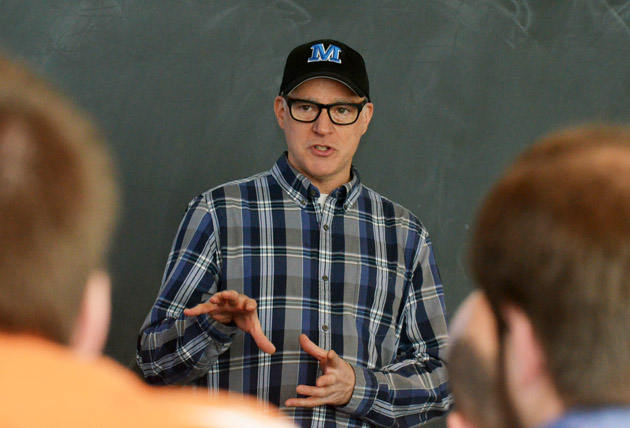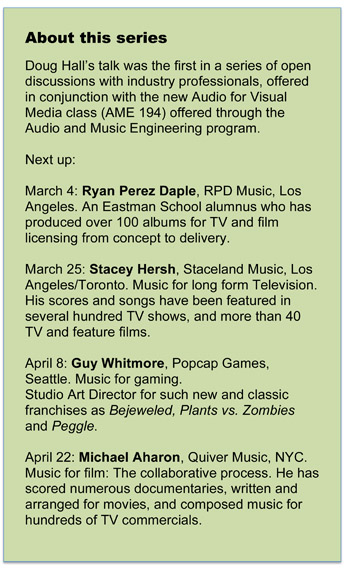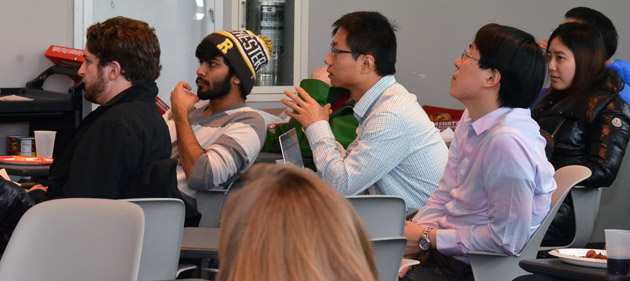'You have to be a one-stop music shop,' composer of music for commercials advises

(Doug Hall of Propeller Music explains the nuts and bolts of writing music for commercials to Audio and Music Engineering students.)
“I have a structured settlement, and I need cash now
Call J. G. Wentworth, 877-CASH NOW”
These are not particularly inspiring lyrics for a composer to work with!
And yet, after Doug Hall synthesized a soundtrack very much in the style of a Gilbert and Sullivan opera, the lyrics were extremely effective as part of a television commercial that was instantly recognized by several audio and music engineering students during Hall’s recent guest lecture here.
“I remember watching that commercial when I was a kid, and literally wondering who wrote that,” one student commented. “And now I know!”
 Hall, one of the top composers in the business, is founder, owner and creative director of Propeller Music. He has written music for more than 1,000 TV and radio ads.
Hall, one of the top composers in the business, is founder, owner and creative director of Propeller Music. He has written music for more than 1,000 TV and radio ads.
He described how he produced virtually all of the music for the Wentworth commercial on computer, except for a piano part he played and vocals by a handful of opera singers, which he layered in.
And that, in a nutshell, speaks volumes about how the business of writing music for commercials has changed since Hall first broke into the industry 32 years ago.
Hall, a ’76 graduate of Dickinson College (where he took courses in music theory, piano and voice), also spent a summer at the Eastman School of Music, taking an arranging class with Bill Dobbins and an electronic music class with Rayburn Wright.
After graduating, he played keyboard for various bands before landing a job in 1983 with Elias Associates, a major music house in New York City, where he spent 10 years as a staff composer.
At that time – which was pre-MIDI (Musical Instrument Digital Interface), and even pre-Macintosh work station – much of the production of music for commercials was done live, Hall explained. “Budgets were better then,” he said. “I could hire a 30-piece orchestra if I wanted to.” And in New York City that meant bringing in some of the best musicians in the country – members of the New York Philharmonic Orchestra, for example, who wouldn’t hesitate to do five or six “jingle dates” a day before heading off for an orchestra performance that night.
That all changed with the advent of software that allows one person to synthesize the sounds of an entire orchestra, working all alone. That drove down the budgets for producing an ad. Moreover, when the record business “imploded,” Hall added, record labels began looking at TV and radio ads as a way to get exposure for their up and coming bands. The added competition further drove down prices.
Now, Hall uses live studio musicians and singers sparingly if at all “mainly because there’s just not the budget for it.” He concentrates mostly on producing “underscores” – music tracks without singing. He uses software like Digital Performer, Logic Pro and East West Quantum Leap Symphonic Orchestra to synthesize the sounds. And he draws on his own skills and experience as a musician and composer to pull it all together.
It is very much a one-man operation. “You have to be self-contained these days, and dependably able to do it all, which includes music research, composing, arranging, programming, engineering, mixing, and above all, listening deeply to and communicating clearly with your clients,” Hall explained. “You have to be a one-stop music shop.”
He offered this advice for anyone who wants to succeed in writing music for commercials:
- Be a good collaborator; above all, be willing to check your ego at the door. “You’re being paid by someone, and they call the shots,” Hall said. “You do your best work, but then you have to become unattached to it.
- ”Be able to play at least one instrument well.
- Use your software well, and use it quickly, because the turnaround for a job may be only a day or two -- or sometimes overnight.
- “You have to be able to mix sounds well, and make it sound like a record,” Hall added. “Mediocre quality doesn't fly anymore.”
- Beware of clients who want you to copy or “rip off” somebody else’s music. Copyright infringement can lead to lawsuits. Instead, tell the client you don’t have to steal the notes, or even the chord changes to come up with something that captures the same mood.
- Initially you may have to work for a company or freelance for multiple companies establish yourself. But once you’ve made a name for yourself, start your own business if possible. “It really is better if you have your own company and clients, because you’re establishing relationships with people,” Hall said. “That’s really what it’s all about in the long run, having people who will come to you as a resource, knowing that they’re going to get good music and that you’ll take care of them. . . . When you are freelancing (for another company) you can’t create those kinds of relationships because you don’t have contact with the client.”
- Once you’re on your own, “you have to get your name out there. Marketing is a big part of it,” Hall said. “If I’m not busy on a job, I’m sending out emails, making phone calls and trying to network in some way.”
When writing for music for commercials, you have to write in many styles, Hall noted. “I’ m really all over the map, from contemporary electronic dance music, to indie folk, orchestra and jazz.
"In a business where you have to be a 'musical chameleon’, after awhile you can begin to wonder what your own musical identity is,” Hall added. “I suggest writing and producing music on the side that’s not connected to any specific project, just to keep yourself grounded as an artist and to keep the creative juices flowing.”

(The students in the audience had plenty of questions for Hall.)
